Burning Sugarcane Pollutes Communities of Color
Air Date: Week of January 20, 2023
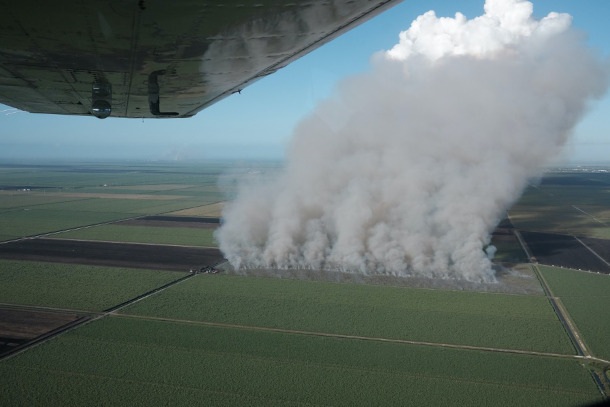
Sugarcane fields are routinely burned to incinerate leaf litter before harvest. (Photo: Courtesy of Jose Jesus Zaragoza)
Some Florida sugarcane growers near the Everglades still use the archaic method of burning fields to remove the tops and leaves before harvesting the sweet cane stalks. Nearby residents say the smoke and ash promote adverse health effects. As reporter Sandy Tolan explains, communities of color nearby assert they bear a disproportionate burden of adverse health effects from the resulting smoke and ash pollution.
Transcript
BASCOMB: It’s Living on Earth, I’m Bobby Bascomb.
CURWOOD: And I’m Steve Curwood.
Sugar cane is a perennial grass that can be harvested as many as five times before being replanted, and for centuries growers would set fields on fire to burn off the tops and leaves before harvesting the sweet canes stalks. Many modern sugar growers use mechanical harvesters to strip away those tops and leaves rather than pollute the air with ash and particulates from burning. But burning still persists in Palm Beach County Florida, where, with support from the Pulitzer Center, reporter Sandy Tolan found this cheap old-fashioned method is imposing disproportionately high health costs on nearby communities of color.
VOICE 1: Maintain a traffic white highway departing 110.
[PLANE AUDIO SFX]
TOLAN: The single engine Cessna flies low, its shadow flitting along the edge of the Everglades. Decades ago, hundreds of square miles were dug, drained, and scraped, then the rich muck planted in sugarcane.
HARTMAN: So, what we're passing is called the Everglades Agricultural Area.
TOLAN: The Atlantic Ocean sparkles in the east. Just along the shore, the mansions of the sugar barons of Palm Beach.
[TRAFFIC CHATTER SFX]
TOLAN: At a thousand feet, we look down on the source of that wealth: half a million acres of sugarcane. Most of that sea of monoculture belongs to U.S. Sugar, and to Florida Crystals, part of the Fanjul sugar empire.
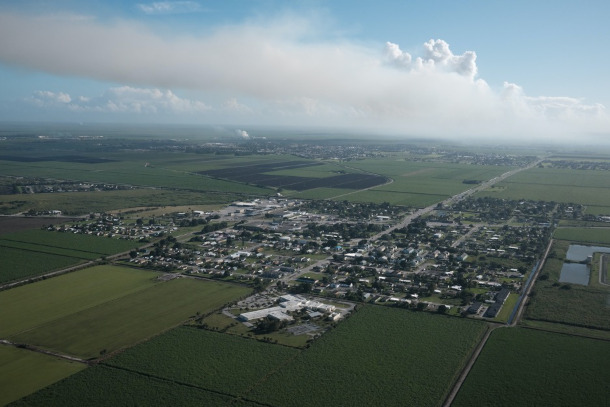
Muck City residents report that ash from sugarcane burns is a constant nuisance and negatively impacts their health. (Photo: Courtesy of Jose Jesus Zaragoza)
[TRAFFIC CHATTER SFX]
TOLAN: Our plane banks to the west. We can see Muck City - the nickname for the largely black towns of Belle Glade, Pahokee, and South Bay. Also known as the Glades.
HARTMAN: I believe that is Belle Glade.
TOLAN: Allie Hartman is with Friends of the Everglades - part of a coalition of environmentalists and local Glades residents fighting the pre-harvest burns.
HARTMAN: Yeah. So, on the left side of the plane here, we're seeing a massive sugarcane burn that starts along that crop line there. And it will continue burning until that entire field has been burned. What it does is it removes what they would call the trash material until only the sugarcane stalk is left. It's a cheaper method for harvest.
TOLAN: Cheaper, and dirtier. How dirty?
[BURNING SFX]
TOLAN: To understand that, I get back on the ground, ride down a washboard cane road, and stop my rental car in front of the flames.
[CAR SFX, BURNING SFX]
TOLAN: It's getting really hot!
TOLAN: From the fire comes smoke; from the smoke: ash. Tons, and tons of ash. The people of Muck City told me about it.
VOICE 2: The ash, unaffectionately known as the black snow. Ash is just raining down upon everything in the community. Your homes, your cars, your food...
VOICE 3: It's like black ash all over the place. It's like raining ash.
VOICE 4: Out of nowhere, you know, you're just sitting there, boom! Ash is on you, you look at your clothes, hey, I got ash on my clothes.
VOICE 5: It messed up our cars and messed up our houses. It messed up our hair. I have natural hair, and when it gets in there, it's really hard to get out.
VOICE 6: Stay inside, keep your windows down or whatever.
VOICE 7: As much as I can try to keep him indoors and say, son, we can't go outside. He's a boy. You know, he wants to run and climb the trees.
VOICE 8: I'm sitting out trying to enjoy a drink. You know, my drink has ash in it and I have to do something about this.
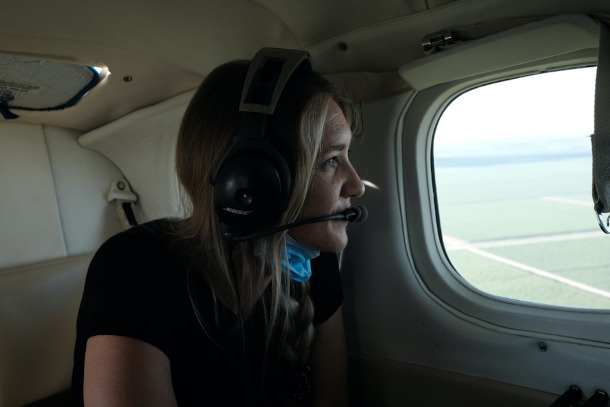
Allie Hartman, Communications Director at Friends of the Everglades, looks out the window at sugarcane fields burning. (Photo: Courtesy of Jose Jesus Zaragoza)
VOICE 9: You would think, like, where is this coming from? Why is it like this?
VOICE 10: It's like it's almost apocalyptic at times, especially when fields are being burnt simultaneously. You know the smoke can block the sun out... the community actually turns dark. It's like, wow, man, this is this is crazy.
TOLAN: It would be crazy just about anywhere else. But the three towns that make up Muck City are company towns. Florida Crystals and U.S. Sugar sponsor little leagues, scholarship programs. They helped pay for a couple of local parks and a community center. But all that comes with a message: don't mess with the burns. Just live with the ash.
PHILLIPS: You know, we felt like, okay, this is just normal. this is what we've been seeing all our life.
TOLAN: This is community activist Kina Phillips of South Bay.
PHILLIPS: You really didn't think like, wow, all these people got asthma like this. Why is this happening? Like, you just don't think about it.
TOLAN: But then Kina Phillips had a grandson.
PHILLIPS: When my grandbaby was born, we noticed that when we take him outside and because it was the burning season, he struggled to breathe. And it got to the point where we had to put him on a machine.
TOLAN: She worked in a hospital and had already started noticing something.
PHILLIPS: Witnessing the increase of people coming in and having to be put on an asthma machine. Or we having to call the ambulance for the kid, to send them to the emergency room because of the shortness of breath and respiratory problems. But when all of these things start happening at one time, you're like, wait, hold on, there's a problem here.
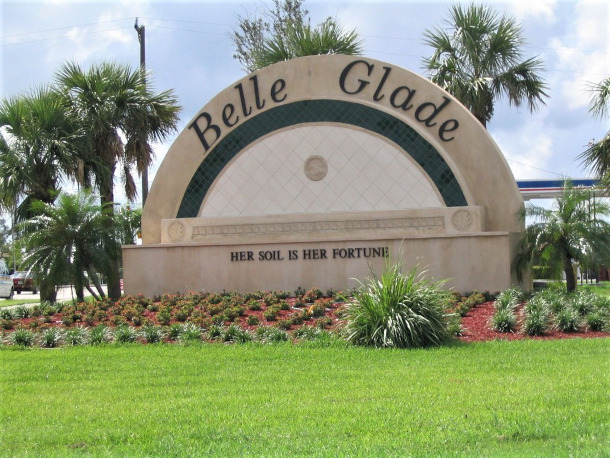
Belle Glade is one of three Florida cities collectively referred to as “Muck City.” (Photo: Blueeagle55, Wikimedia Commons, CC BY-SA 4.0)
TOLAN: So Kina Phillips, working with the former mayor of South Bay, called in the Sierra Club. The Stop the Burn Campaign was born.
PHILLIPS: We came on board and refused to be quiet about it.
TOLAN: Then their colleague Robert Mitchell formed the Muck City chapter of Black Lives Matter. Ms. Phillips says, this is an environmental justice issue.
PHILLIPS: It's racism.
TOLAN: Soon after, they called on Colin Walkes, then the mayor of Pahokee.
WALKES: The Glades welcome my family from the island of Barbados. I migrated here in 1982 with my mom, dad, sister, and brothers
TOLAN: Colin Walkes sits in a city park in Pahokee, the waves of Lake Okeechobee lapping the shore. He was 10 years old when his family moved to Muck City. After Pahokee High, Colin Walkes moved away for a while. Joined the army. Got his bachelor's in criminal justice. Became a probation officer. And then about 12 years ago, he came back with his own family.
WALKES: One of the reasons I got involved, too: I have a young son that is asthmatic. And since he's been here, he's had about maybe eight or nine asthma attacks. it happens during the Christmas break, you know, during Thanksgiving.
TOLAN: In other words, when the burns were going on. He began to worry about those burns. Then he ran for mayor of Pahokee, and won. He met with Kina Phillips and joined the Stop the Burn campaign.
WALKES: When I was in office, of course, I spoke out against the industry and I don't really call it speaking out. I called it an ask, to basically stop the practice of sugar cane burning.
TOLAN: And adopt safer, cleaner green sugar harvesting, with no burning. In Brazil and Australia, studies indicate green harvesting reduces soil erosion and conserves water. But Mayor Walkes soon realized he, and Kina Phillips, and a handful of other activists, were in a pretty small minority. And that had consequences.
WALKES: Speaking out against our industry as far as the practice of sugar cane burning is kind of like a death sentence here in the community when it comes to your livelihood.
TOLAN: When Colin Walkes ran for re-election, he lost. And then he lost a lot more.
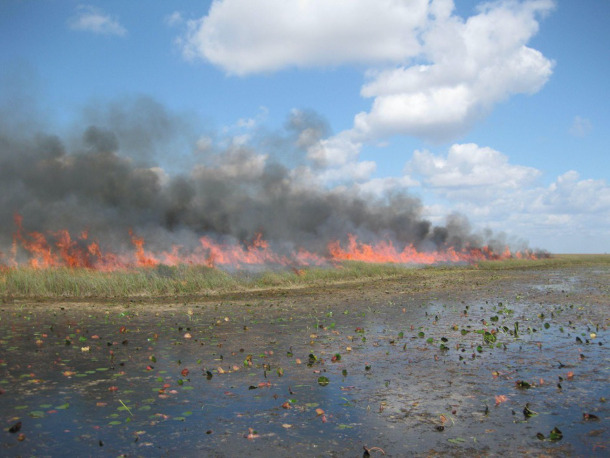
Sugarcane burning near the Florida Everglades. Advocates worry that burning sugarcane poses health hazards. (Photo: Florida Fish and Wildlife, Flickr, CC BY-ND 2.0)
WALKES: The most extreme thing that happened to me was happened in 2021 where I was actually fired from my job.
TOLAN: It was his fulltime job in community engagement, for a local nonprofit. When he engaged citizens on public health and sugarcane burning, he said powerful people complained, and he was out.
WALKES: And it really rocked me. You know, you have a daughter in college, you know, two young sons in the home, a wife. You got a mortgage, car notes and all these type things. I actually lost my home, you know?
[WAVES SFX]
WALKES: You have kinds, you know, my boys, oh. "We've got track meets coming up, Dad, or we got this with the band, you know, we got this with robotics." So, it's a tough situation to be in when you have to tell your kid, well, uh, uh, not going to be able to make the meet, not going to be able to make the meet because of basics like gas. You can see the disappointment in your kid's face. "Aw, Dad, man, I thought you was gonna make it to it."
[WAVES SFX]
WALKES: For about a month, we were actually homeless. I actually slept in the park for two nights, here in Pahokee, yeah. We lived in the in the homeless shelter for about a week, a week and a half. You know, my kids were staying with my mom, you know, but we were in the homeless shelter.
TOLAN: The former mayor had to think fast: He put the family savings into a gigantic charcoal smoker and food trailer.
WALKES: This is the firebox…
TOLAN: Now, Coal Brothers Cuisine began showing up at little league and high school football games on the weekends.
WALKES: ...and this is all indirect heating...
[FOOD SIZZLING SFX]
TOLAN: And Colin Walkes kept speaking out against the burns. The campaign wants this year to be the last burn season.
[FOOD SIZZLING SFX]
TOLAN: And so how unsafe are the burns, really? You hear a lot of stories about asthma attacks, more nebulizers in use, strange rashes, even people moving away entirely to get out from under the Black Snow. There's a whole lot of anecdotal evidence of health problems, and not just from the Stop the Burn folks. There's not much official interest in Muck City for in-depth health investigations. Internal studies by the Palm Beach county health department did link cane burning to toxic pollution and potential respiratory and carcinogenic effects. That's according to an investigation by Pro Publica and the Palm Beach Post. Publicly, though, a state official said there was no such proven link. And the many pro-sugar people here say critics are hyping the dangers without enough evidence.
JACKSON MOORE: I'm Tammy Jackson Moore. I've been in the Glades about 30 years, raised my children here.
TOLAN: Ms. Jackson Moore is co-founder of Guardians of the Glades, a community group aligned with the big sugar companies. She says the ash doesn't rain down every day during the burning reason, and when it does --
JACKSON MOORE: I get up and I sweep my porch and I go on about my day. I have never had an asthma attack since I moved here to this community. But I had terrible asthma when I lived in Jacksonville. Do people have asthma in our community? Absolutely. Can we equate their asthma to sugar cane burning? I don't think so. I'm not a doctor. I'm not a scientist. I don't think it's equated. There may be something that helps to trigger their asthma during the during the burning season, but that something could be what's growing here. It could be some of the flowers, it could be anything. But to say that it is because of sugar cane burning, and lay it all on sugar cane burning, I think that's unfair.
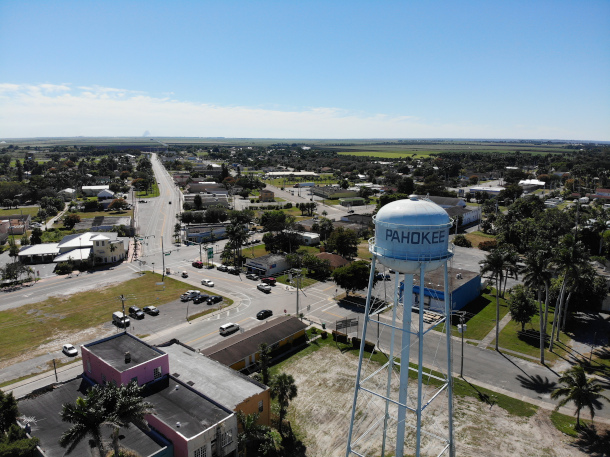
Pahokee Florida is part of what is colloquially known as “Muck City” and is often subject to the impacts of burning sugarcane. (Photo: Yanjipy, Wikimedia Commons, CC BY-SA 4.0)
TOLAN: You may be wondering what Big Sugar is saying. To me? Very little. I called, texted, emailed dozens of times. Finally, someone called back saying: we're not going to meet with you. A PR person for the Fanjuls' Florida Crystals wrote to say that because of previous stories they called unfair and inaccurate, they'd agree to an interview only if it were live on the air and unedited. Which rules out this and just about any other radio program or podcast, so, kind of unrealistic. Florida Crystals did send a statement signed by their vice president. He spent three pages describing their charitable work in education, sponsoring the Muck City Hall of Fame, providing sugar and rice during Covid and other efforts. About the burns, this, read by my colleague:
VOICE 11: Pre-harvest sugarcane prescribed burns are closely regulated and permitted on a daily, field-by-field basis by Florida Forest Service. Before authorizing or denying a permit, the state agency uses state-of-the-art computer modeling with real-time information about atmospheric and meteorological conditions. Air quality monitoring and data show that the area where sugarcane is farmed has some of the best air quality in the State of Florida – better than the state average, year after year.
TOLAN: Just to note: we did edit the company's statement. Reading it out loud, at a normal pace, it took me 13 minutes - almost as long as this entire story. But, what about that air quality claim? Is the air quality around the cane and in Muck City actually better than the rest of Florida? Well...
FERGUSON: To begin with, we know that the amount of particulate matter pollution produced annually by pre harvest sugar field burning during the harvesting season is roughly equivalent to the amount of particulate matter pollution produced by automobile vehicles throughout the state of Florida per year.
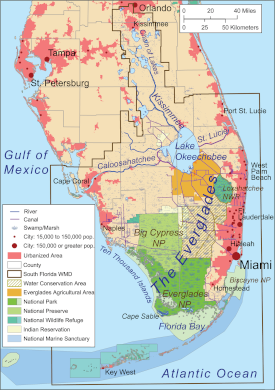
A map of the Everglades. Much of the sugarcane burning activity occurs in the Everglades Agricultural Area, which is highlighted in gold. (Image: Kmusser. Wikimedia Commons, CC BY-SA 3.0)
TOLAN: That's the Sierra Club's Patrick Ferguson, an organizer and attorney who set up shop in a storefront in Belle Glade, to work with Kina Phillips, Colin Walkes and other local campaign leaders. He points to studies in peer-reviewed journals linking cane burning to high concentrations of particulate matter, and to release of carcinogenic chemicals like benzene and formaldehyde. Bottom line, Ferguson says:
FERGUSON: The issue of sugar cane burning is a serious public health problem.
TOLAN: In late 2021 a joint study by Stanford University and NPR found that some of the worst air in the U.S. is in Florida's sugarcane plantations. So, wait: How could the area have both the cleanest air in the state and the worst air in the country? Some say it all comes down to air quality monitors: where they're located, how often they sample, and simply, how many there are.
FERGUSON: The federal air quality monitors that are used to determine compliance with national ambient air quality standards are generally determined by population densities.
TOLAN: And since there just aren't that many people in the Glades: far fewer monitors. So, reporters for ProPublica and the Palm Beach Post set up their own air sensors to register particulate matter, and documented big spikes in pollution during the burns - spikes that the other monitors seemed to miss, says Patrick Ferguson.
FERGUSON: And on days when there were spikes of particulate matter pollution it was when sugar cane burning was blowing in the directions of some of these monitors.
TOLAN: Now. Big Sugar disputes this. The companies accused Pro Publica of "selectively presenting their preferred interpretation" in support of a "biased conclusion,” even suggested they were collaborating with environmental activists - charges the journalists refuted.
NEWS REPORT: A new study raises some troubling concerns about the air quality in western Palm Beach County. CBS 12's Al Pefley says the study looked at the results of sugarcane burning...
TOLAN: But then, late last summer, a peer-reviewed study said particulate matter from the burns contributed to between two and three additional deaths per year across South Florida. It made the evening news.
NEWS REPORTER 2: Researchers from Florida State University looked at information from an atmospheric dispersion model... (dips under)
TOLAN: In the Glades, U.S. Sugar issued a statement.
NEWS REPORTER 3: …saying the FSU study is based on estimates and conjecture, and the statement says, quote, "shame on Florida State University for having its good name associated with such shoddy work."
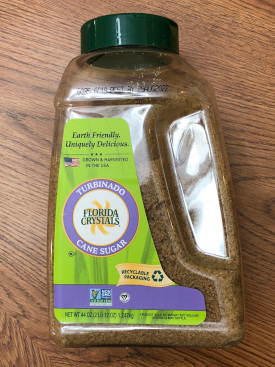
Florida Crystals is one of the sugar companies burning sugarcane in the Everglades area. (Photo: Famartin on Wikimedia Commons, CC BY-SA 4.0)
[BURNING SFX]
TOLAN: But, no matter how good the air really is, no matter how harmful the ash and smoke, there's one question the pro-sugar folks could never seem to answer.
[BURNING SFX]
TOLAN: Why do state officials allow the burns, when the ash falls on communities of color Muck City. And yet, they ban the burns when the wind blows east, toward majority-white communities: the stables and equestrian riding clubs of Wellington, and the Fanjul mansions in Palm Beach?
TOLAN: Sounds hard to believe, right? But documents from a public records request to the Florida Department of Agriculture show: it's a fact. I wanted someone from the sugar industry willing to face my microphone. For a long time, I couldn't find anyone.
REV. REASE: Let us stand and greet everyone, look around...
TOLAN: And then one day, of all places, - in church, I found him.
REV. REASE: God bless you. It's so good to see everyone here this morning
TOLAN: I've come to talk to Rev. Robert Rease, a pro-sugar pastor.
REV. REASE: …Come up and greet the congregation...(dips under)
TOLAN: But, surprise, here in the Lord's house, there's State Rep Rick Roth -- a politician and a sugar grower,
ROTH: Morning, everyone. It's a good day to be in the house of the Lord. Praise God.
TOLAN: He's hawking votes two days before the election…
ROTH: My heart is in the Glades. I've got muck underneath my toes. Thank God I am here today. We need people that fear God to run for public office. Please, I'm asking for your vote...
TOLAN: Now, Rick Roth slips out the back door. And a little rudely, I suppose, so do I.
[DOOR CLICKING, WALKING SFX]
TOLAN: Representative Roth? Representative Roth?...
[WALKING SFX]
TOLAN: He's a bit surprised to see me. But he agrees to talk - and he insists, there's nothing dangerous in the ash.
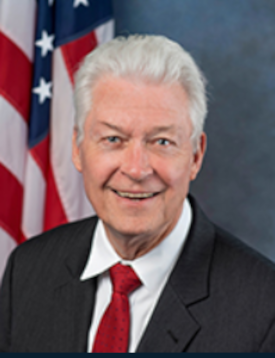
Florida state representative Rick Roth claims that burning sugarcane is safe. (Photo: Florida House of Representatives, MyFloridaHouse.gov, Public Domain)
ROTH: Well, it's funny. We've been doing cane burning ever since the industry really got going in the early 1960s. We have air quality monitoring. We have regulations. Burning is not dangerous to your health unless you're standing out in it and trying to breathe it. It's not an air quality issue. I don’t think it’s a health issue.
TOLAN: I want to ask you one more question…
TOLAN: This burning question: If everything is so safe, why let the Black Snow fall on Muck City, but then, when the wind blows east, toward those wealthier communities, pull the permits?
TOLAN: And a lot of people in Belle Glade feel like that's not fair.
ROTH: The cities had nothing to do with that. This is a Florida regulation.
TOLAN: But what do you think about that? I mean, they’re like…
ROTH: Well, the issue is you always have to make decisions. This is not a hazard. It is obviously an agenda.
TOLAN: But why would why...
ROTH: I’m saying it's an agenda, It's not an issue.
TOLAN: No, but I'm asking you, what about when the wind shifts and they pull the permits?
ROTH: (Pause) The, the regulations are done to do the least amount of harm possible. There is no data, no scientific data, to my knowledge. But you've asked four questions on this issue. Like it's as important as the economy, and it's not.
GOSPEL SINGER: Jesus loves the little children...all the children of the world. Red, yellow, black and white, they're all precious in his sight...
[MARCHING BAND SFX]
TOLAN: In Muck City, right up there with church, is football. This place has produced some 60 NFL players over the years. And no event pulls together the community - sugar boosters and burn critics alike - than the annual Muck Bowl game between Belle Glade and Pahokee high schools. It's Florida's ‘Friday Night Lights’ - and it's where I find Belle Glade Mayor Steve Wilson, just before kickoff.
MAYOR WILSON: We support our industry 100%. We make that clear with everybody.
TOLAN: Mayor Wilson gets pretty annoyed when he talks about the stop the burn campaign.
MAYOR WILSON: I've been here practically all my life. I was born in the city of Belle Glade. I have grandkids here. My kids are here. Do you really believe that I will expose my kids to an environment that's going to really be hazardous, to kill them? I have to be crazy. I love my family more than anything in this world. So all the critics and the naysayers, those folks who always got something to say, you know what? It's a part of life. We move on.
[FOOTBALL GAME SFX]
ANNOUNCER: We do want to make sure we give recognition to Florida Crystal. Let's give it up to all of our large donors…
CHEERLEADERS: BE! AGRESSIVE! B-E A-G-G-R-E-S-S-I-V-E! BE! AGRESSIVE...
[FOOTBALL GAME SFX, CHEERING SFX]
TOLAN: Just before halftime, I find the former mayor of Pahokee, and now-barbecue maestro, Colin Walkes. Today, his alma mater is already ahead by three touchdowns, and the former Pahokee high linebacker is serving up ribs.
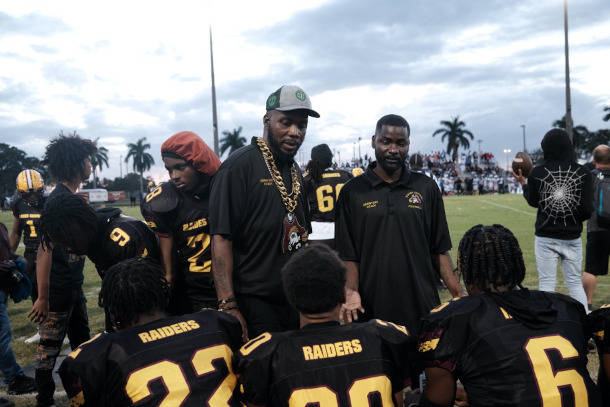
The coach for Glades Central talks to his players. The annual Muck Bowl game between Belle Glade and Pahokee high schools is a beloved community event. (Photo: Courtesy of Jose Jesus Zaragoza)
WALKES: Nothing ever replaces the experience of the mock bowl, you never forget it's like it's constantly playing in your head...you know I can visualize my last mock bowl from 1991. You know, you replay it in your head, all the tackles, all the plays.
TOLAN: Unlike Mayor Wilson, Mayor Walkes took on the sugar companies. After losing two jobs, losing his home, he had to reinvent himself with his Coal Brothers smoked meat.
WALKES: And my love and passion for cooking come from my mom and dad, you know, again, from Barbados, so my food has a kind of Caribbean taste to it
TOLAN: I get chicken on a stick. Tasty and a little bit sweet. Colin Walkes says, it's all good.
WALKES: Never in a million years would I thought I would have been in a situation like that. It cost me a lot. But we're rebuilding and I thank God for his grace and mercy once again, you know, for a sound mind and spirit and soul and a clean heart, you know, that you can rebuild. This is a story of redemption, you know? Yeah. Because I'm happy. Yeah, I'm happy, so...
[CHEERING SFX]
TOLAN: And one thing that would make him even happier: If this year, out on those hundreds of thousands of cane fields, it's the very last season of the burning.
[CHEERING, APPLAUSE SFX]
TOLAN: For Living on Earth, this is Sandy Tolan, in Palm Beach County, Florida.
VOICE 12: That's what we do! That's what we do!
[CHEERING, APPLAUSE SFX FADES]
CURWOOD: Support for Sandy’s story came from the Pulitzer Center for Crisis Reporting.
Links
Watch Friends of the Everglades’ video series The Last Burn Season here
Click here to read Pro Publica’s work on sugarcane burning in Florida
See how sugarcane burns color Belle Glade’s landscape on NASA’s Earth Observatory
Living on Earth wants to hear from you!
Living on Earth
62 Calef Highway, Suite 212
Lee, NH 03861
Telephone: 617-287-4121
E-mail: comments@loe.org
Newsletter [Click here]
Donate to Living on Earth!
Living on Earth is an independent media program and relies entirely on contributions from listeners and institutions supporting public service. Please donate now to preserve an independent environmental voice.
NewsletterLiving on Earth offers a weekly delivery of the show's rundown to your mailbox. Sign up for our newsletter today!
 Sailors For The Sea: Be the change you want to sea.
Sailors For The Sea: Be the change you want to sea.
 The Grantham Foundation for the Protection of the Environment: Committed to protecting and improving the health of the global environment.
The Grantham Foundation for the Protection of the Environment: Committed to protecting and improving the health of the global environment.
 Contribute to Living on Earth and receive, as our gift to you, an archival print of one of Mark Seth Lender's extraordinary wildlife photographs. Follow the link to see Mark's current collection of photographs.
Contribute to Living on Earth and receive, as our gift to you, an archival print of one of Mark Seth Lender's extraordinary wildlife photographs. Follow the link to see Mark's current collection of photographs.
 Buy a signed copy of Mark Seth Lender's book Smeagull the Seagull & support Living on Earth
Buy a signed copy of Mark Seth Lender's book Smeagull the Seagull & support Living on Earth

